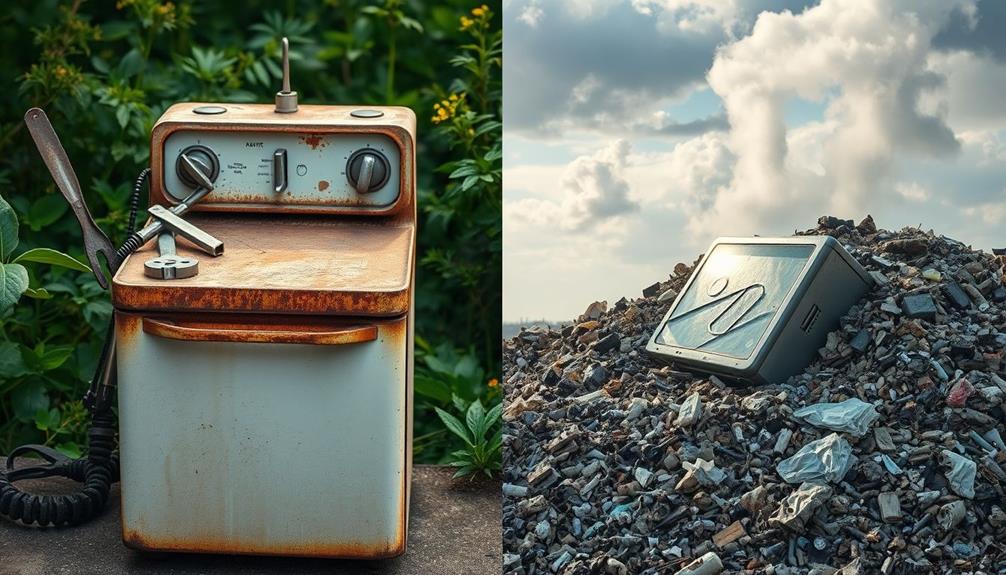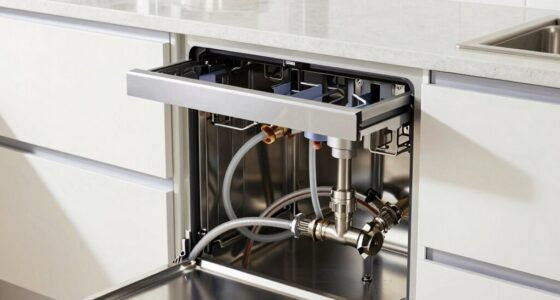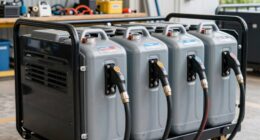When you weigh the pros and cons of replacing old appliances as opposed to repairing them, the impact on the environment is substantial. Repairing appliances helps to decrease waste, conserve natural resources, and reduce greenhouse gas emissions. Every repaired appliance prolongs the necessity for new manufacturing, which is a major contributor to climate change. This leads to less electronic waste generated and a decrease in your overall carbon footprint. Additionally, maintaining appliances is typically more cost-effective and benefits local economies. By opting to repair, you are contributing to a more sustainable future and becoming part of a growing movement towards eco-friendly practices. Keep exploring to uncover more ways to make environmentally conscious choices!
Key Takeaways
- Repairing appliances conserves natural resources and reduces waste, while replacing them generates significant landfill overflow and electronic waste.
- Each repair significantly lowers greenhouse gas emissions compared to manufacturing new products, which contributes to 25% of U.S. emissions.
- Extending appliance lifespans through repairs decreases the need for new manufacturing, thus protecting ecosystems and reducing raw material extraction.
- Repairs are cost-effective, typically costing only 10-20% of a new appliance, leading to long-term savings and lower utility bills.
- A focus on repair fosters a circular economy, promoting sustainable practices and creating job opportunities in the repair sector.
Environmental Benefits of Repairing
When it comes to appliances, many don't realize the significant environmental benefits of repairing over replacing. By choosing to repair, you actively contribute to reducing waste and conserving natural resources. Each repaired appliance prolongs its lifespan, delaying the need for new manufacturing, which is responsible for about 25% of greenhouse gas emissions in the U.S. This decision not only lowers your carbon footprint but also promotes a sustainable future.
Additionally, maintaining appliances like air purifiers, which can improve indoor air quality, is essential for efficiency and performance, making repairs even more beneficial for both your health and the environment regular maintenance guarantees peak performance.
Repairing appliances typically consumes less energy than manufacturing new products, further reducing energy consumption and greenhouse gas emissions associated with production. Every time you opt for a repair instead of a replacement, you help decrease landfill waste. This choice minimizes the environmental footprint of discarded products and alleviates the burden of electronic waste, a major contributor to pollution and landfill overflow.
Moreover, embracing a repair culture encourages sustainable practices. Experts estimate that a circular economy focused on repair could achieve 20% material savings by 2050. By prioritizing repairs, you're not just fixing an appliance; you're making a positive impact on the planet and taking steps toward a more sustainable way of living.
Carbon Footprint Reduction
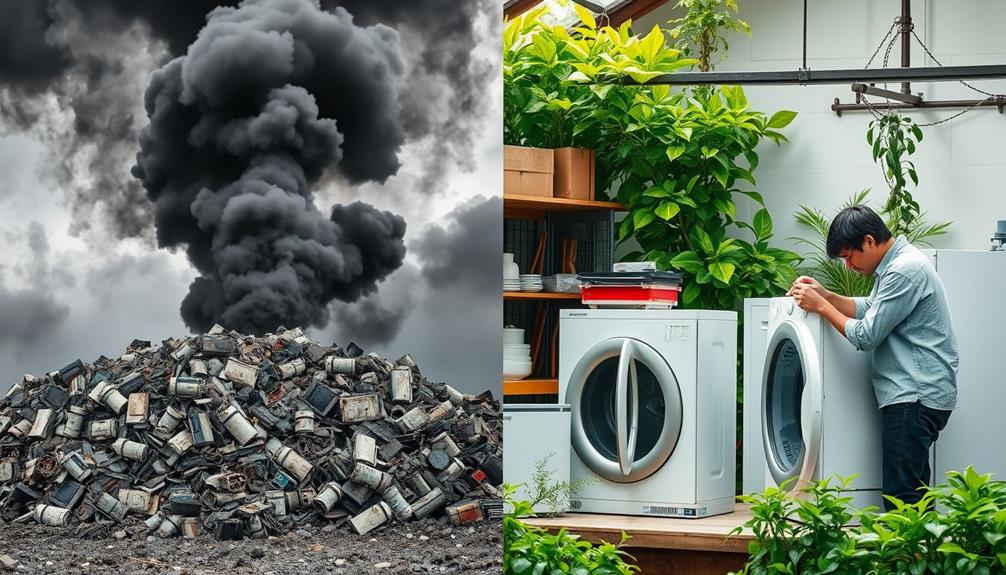
When you choose to repair your appliances, you're not just saving money; you're also making a significant impact on carbon footprint reduction.
By extending the lifespan of your devices, you cut down on energy consumption and decrease waste, all while conserving valuable resources.
For instance, maintaining your HVAC system can enhance its efficiency, which in turn minimizes energy use and reduces emissions importance of HVAC maintenance.
Let's explore how these choices contribute to a healthier planet.
Energy Efficiency Comparison
Repairing appliances can considerably cut down your carbon footprint compared to buying new ones. When you opt for repairing appliances instead of replacing them, you're using considerably less energy.
Manufacturing new appliances involves energy-intensive processes of creating that contribute to about 25% of U.S. greenhouse gas emissions. By extending the lifecycle of the appliance through repair, you not only keep it running efficiently but also help reduce the carbon footprint associated with production.
Additionally, incorporating sustainable practices such as mindful eating practices in your lifestyle can further enhance your overall environmental impact.
Moreover, repairing reduces the demand for new products, which means less extraction and processing of raw materials like metals and plastics. This further minimizes the energy required and the greenhouse gas emissions linked to these activities.
The environmental benefits of repair are clear: you're making a sustainable alternative that aligns with eco-friendly goals. Instead of contributing to the carbon emissions tied to manufacturing, you're choosing a path that supports sustainability and lessens your overall impact.
Waste Reduction Benefits
Every time you choose to repair an appliance instead of tossing it aside, you're making a significant impact on waste reduction. By opting for repair, you directly reduce electronic waste, which contributes to landfill overflow and environmental degradation. Millions of appliances are discarded annually, exacerbating this issue.
Additionally, similar to the benefits of diversifying investments in your financial portfolio, extending the lifespan of your appliances decreases waste and promotes sustainable practices.
When you extend the lifespan of your appliances, you also lower the demand for new manufacturing, which accounts for a notable 25% of greenhouse gas emissions in the U.S. Repairing appliances requires far less energy than producing new ones, helping to minimize overall carbon emissions linked to manufacturing and transportation.
Moreover, each repaired appliance conserves valuable resources. Manufacturing new products demands substantial raw materials, leading to habitat destruction and increased energy consumption.
Additionally, by repairing instead of replacing, you help mitigate the harmful emissions generated from landfills. Less waste means reduced methane production, a potent greenhouse gas that contributes to climate change.
In essence, your choice to repair not only reduces waste but also plays a critical role in mitigating climate change, promoting a healthier environment for all.
Resource Conservation Impact
Choosing to repair appliances not only addresses waste reduction but also greatly impacts resource conservation and carbon footprint reduction. When you opt for repairing instead of replacing, you contribute to considerable environmental benefits, including a reduction in demand for new manufacturing and the associated greenhouse gas emissions that contribute to climate change.
Additionally, the energy and materials conserved can be compared to the efficiency benefits seen in geothermal energy systems.
Repairing appliances extends their lifespan, which means you decrease the need for raw materials like metals and plastics. This conservation effort helps protect natural ecosystems and reduces the substantial energy consumption associated with manufacturing new products.
Did you know that manufacturing accounts for 25% of greenhouse gas emissions in the U.S.? By choosing to repair, you can lower your carbon footprint considerably.
The energy required for repairs is far less than what's needed for new manufacturing, making repairs a far more sustainable choice. As highlighted by the Ellen MacArthur Foundation, fostering a repair culture could save 20% in materials by 2050.
Resource Conservation Strategies

Sustainability thrives on the conscious choices we make regarding our appliances. By opting for repairing over replacing, you actively engage in resource conservation, which remarkably lowers energy consumption and greenhouse gas emissions. Every appliance you repair extends its lifespan, which reduces the carbon footprint associated with new manufacturing processes.
Consider the following benefits of a repair culture:
| Strategy | Environmental Benefits | Impact on Resources |
|---|---|---|
| Repairing Appliances | Reduces electronic waste in landfills | Conserves raw materials |
| Extending Lifespan | Lowers energy use in production | Minimizes habitat destruction |
| Circular Economy | Potential for 20% material savings by 2050 | Decreases resource extraction |
| Carbon Footprint | Less energy consumption during production | Lowers overall emissions |
Repairing not only prevents toxic materials from polluting our environment but also contributes to a healthier planet. By embracing repair culture, you help mitigate the widespread issues of electronic waste and resource depletion, promoting a sustainable future for generations to come. Your choices matter—let's make them count!
Economic Advantages of Repairing
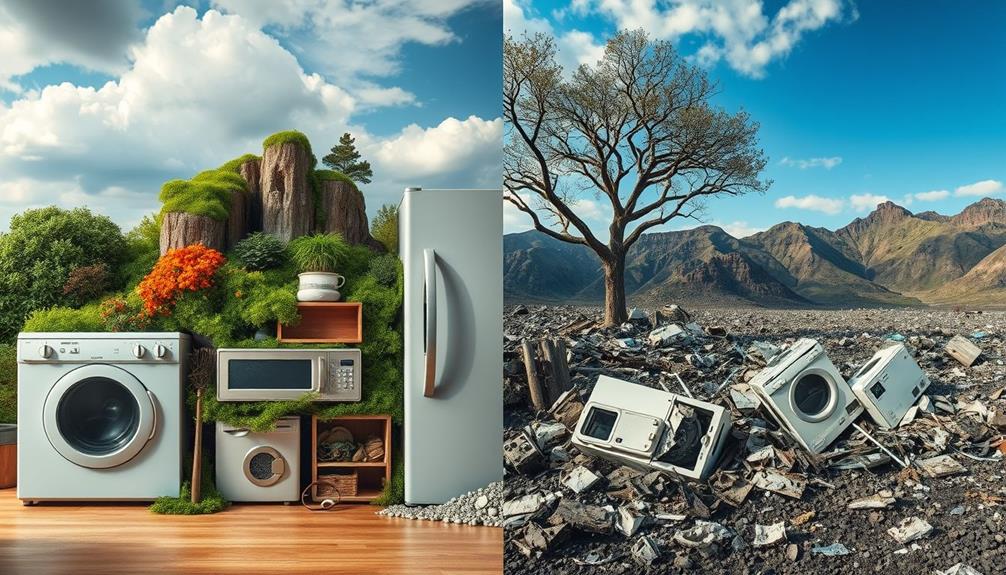
Repairing your appliances can save you a lot of money, often costing just 10-20% of what a new one would. This not only reduces waste but also minimizes the environmental impact associated with manufacturing new appliances, making it a more eco-friendly choice.
Additionally, opting for repair maintains the longevity of existing products, which aligns with the principles of key factors in choosing a home cleaning service by promoting sustainability in everyday practices.
Not only does this approach help your wallet, but it also supports job creation in the local repair sector. By choosing repair, you're not just saving money; you're also contributing to a more sustainable economy.
Cost-Effective Solutions
Appliance repairs offer a financial lifeline for consumers looking to save money while minimizing waste. Choosing to repair instead of replace can result in significant savings, often costing only 10-20% of the price of a new appliance.
By extending the lifespan of your appliances through repair, you not only save money but also reduce the demand for new products, which in turn helps lower greenhouse gas emissions. For example, repairing essential household items like garage door openers can lead to considerable cost savings while enhancing home security.
Here are some cost-effective solutions to contemplate:
- Save money on long-term expenses by avoiding frequent replacements.
- Utilize repair services that provide affordable options for fixing your appliances.
- Delay costly replacements, allowing you to invest in energy-efficient models later.
- Benefit from trade-in programs that offer discounts on new purchases.
- Enjoy warranties that protect against unforeseen repair costs.
Job Creation Potential
The growing repair industry not only offers a way to extend the life of your appliances but also has significant economic advantages, particularly in job creation. As the demand for sustainable repair practices increases, the repair sector could create around 200,000 jobs in the EU by 2030.
Top platforms for freelance gigs like Upwork and Fiverr can also benefit from this trend as more technicians seek to offer their services online. By choosing to invest in repairing appliances instead of replacing them, you stimulate local economies, supporting small businesses and generating employment opportunities for technicians and service providers.
A strong repair culture fosters community engagement, promoting job creation in various sectors, including maintenance, customer service, and parts supply.
When you opt for repairs, you not only save money—spending just 10-20% of the cost of a new appliance—but also contribute to a sustainable economy that encourages manufacturers to design products that are easier to repair.
This cycle not only enhances the job creation potential in the repair industry but also leads to extended product life and environmental benefits.
Long-Term Savings
Often overlooked, the economic advantages of repairing appliances can lead to substantial long-term savings for consumers. By choosing to repair rather than replace, you can enjoy a range of benefits that positively impact both your wallet and the environment:
- Repairing typically costs only 10-20% of a new appliance.
- Extending an appliance's lifespan saves money on utility bills, similar to how cats' health can be maintained through regular vet check-ups.
- Reducing waste helps lower municipal waste management costs.
- Repair services can stimulate local economies and create jobs.
- Promoting a repair culture encourages sustainable consumer choices.
With older appliances often consuming more energy, repairing them allows you to cut down on energy use and save on those pesky utility bills.
Additionally, investing in repair services offers significant economic and environmental benefits, as it reduces waste and prolongs the life of your appliances.
By embracing a repair culture, you make economically sound choices while minimizing your environmental impact.
Ultimately, the long-term savings from repairing appliances contribute to a more sustainable future, benefiting both your finances and the planet.
The Circular Economy and Design
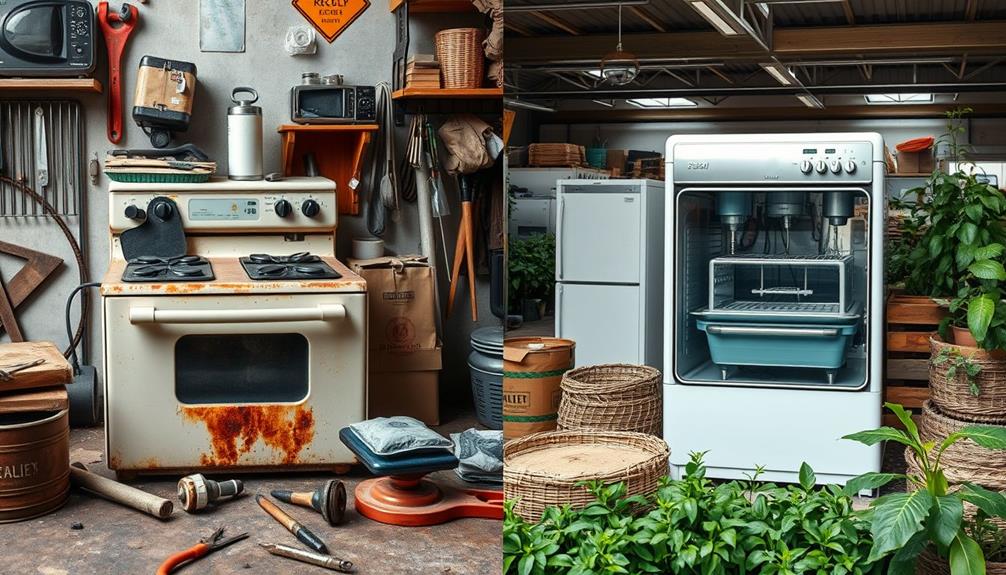
Designing products with a focus on sustainability can lead to remarkable benefits for both the environment and consumers. Embracing a circular economy means prioritizing repairable product designs that enhance longevity and minimize waste.
When appliances are easier to disassemble and maintain, they not only last longer but also contribute to significant waste reduction. This approach mirrors the principles of modern design, such as the integration of natural materials and vintage elements that emphasize authenticity and durability, similar to modern farmhouse decor trends.
By choosing repairable designs, you help combat environmental degradation while saving money in the long run. This approach aligns with sustainable practices, reducing the resource extraction and energy consumption typically required for new manufacturing.
Additionally, a shift toward these designs creates job opportunities in the repair sector, fostering a thriving economy centered on sustainability.
Manufacturers are encouraged to innovate and commit to eco-friendly goals when you demand durable and repairable products. As a result, your choices can drive a change in production practices, pushing companies to examine the lifecycle of their products.
Future Trends in Repair Practices

Shifting towards a circular economy naturally leads to a heightened focus on future trends in repair practices. You can expect to see significant changes in how we approach repairing and prolonging the life of appliances. Here are some trends to watch for:
- The rise of the right-to-repair movement, ensuring access to repair resources.
- Manufacturers embracing designs that prioritize longevity and repairability.
- Community repair initiatives, like cafes and workshops, promoting sustainability.
- Online DIY resources, empowering individuals to tackle repairs themselves.
- Eco-friendly brands gaining market traction by focusing on repairable designs.
These shifts highlight the environmental benefits of repair, emphasizing how reducing electronic waste can save a significant amount of energy and resources.
As more people embrace repair culture, it'll drive the demand for products that are easier to fix. This future for our planet is promising, as it fosters a sustainable mindset and reduces our reliance on energy-intensive manufacturing processes.
Frequently Asked Questions
How Does Repairing Things Help the Environment?
Repairing things considerably helps the environment by reducing waste and conserving resources. You minimize energy consumption, prevent harmful substances from leaking into ecosystems, and encourage sustainable practices, all of which contribute to a healthier planet.
What Is the Environmental Impact of Home Appliances?
Home appliances greatly impact the environment. They contribute to greenhouse gas emissions during manufacturing, consume energy, and create waste. By understanding their effects, you can make informed choices that promote sustainability and reduce your carbon footprint.
How Do Appliances Affect the Environment?
Did you know that appliances account for about 13% of your home's energy use? They impact the environment considerably, contributing to greenhouse gas emissions and resource depletion, particularly when you replace them instead of repairing.
What Are the Benefits of Appliance Repair?
You'll save money by repairing appliances instead of buying new ones, potentially cutting costs by 80-90%. Plus, you'll extend the lifespan of your devices, supporting local economies and fostering a more sustainable community.
Conclusion
In the end, choosing to repair instead of replace old appliances is like giving a vintage car a new lease on life; it not only reduces your carbon footprint but also conserves valuable resources. Think about it—every appliance you fix is a small win for the planet, saving an average of 90% of the energy used in manufacturing a new one. So next time something breaks, remember: a little TLC can go a long way for both your wallet and the environment.
